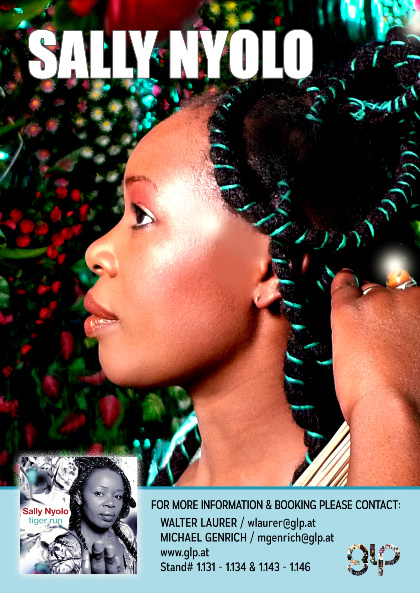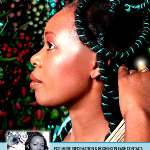- country:Central African Republic
- region:Central Africa
- style(s):World
- label:Lusafrica
- gender:female
- artist posted by:Georg Leitner Productions GmbH
Tiger Run is Sally Nyolo’s 7th album,
musically the richest, poetically the most open, spiritually the deepest in her discography.
“After focusing on the characteristic rhythms of Cameroonian music for so long, I wanted a change, so I returned quite deliberately to that elementary act, usually performed without any interior thought, the act of walking. I tried to associate my steps with the most natural way of breathing, as if I were meditating. I did this for several days until the musician in me took over, transforming those steps into rhythm. Then I added the symbolic – even totemic - image of the tiger, returning to the meaning of “mó ngone metame mezeï” – my name Mvet which means “daughter of the tiger’s whiskers”, as a reminder that we are only one link in nature’s chain”.
By going back to Cameroon and rediscovering her village life as a little girl, cultivating Eton, the highly musical language of the Béti tribe to which she belongs, and distilling its hectic Bikutsi music and a concept of the animist world in complete harmony with nature, she ceased being a backing singer (Higelin, Nicole Croisille) and joined the a capella group Zap Mama, later becoming a full-time performer-researcher. With her Tiger Run album, she returns to the deepest, most secret part of her being, in a sensorial metamorphosis, and spreads her wings as a musician. Her song Tiger Run, which gives its name to the whole album, has much to say about wings and taking flight because in it Sally declares, in English, that she is as free as a bird. In the album’s ten songs, she reveals herself as many-faceted, sensual, maternal, committed, a satirist, a story-teller, a multi-lingual poet and, above all, a magician.
With Tiger Run, Sally marks out her musical territory,
the territory she inherited from her childhood in the forests of Cameroon where you can’t live isolated from others or detached from the presence of your ancestors, where you are never an “empty gourd”, to quote the apt words of the novelist Leonora Miano, a French-Cameroonian like Sally and, with Sally, one of the world’s ten most famous Cameroonians. In Sally’s music, all those ancestral memories rise up to feed her inspiration, free her words, penetrate the heart of the drum and make the soul of the mvet ring in its gourds. Like a watermark, we hear the mvet, that fabulous instrument – half harp, half lute – [known in English as the stringed zither], bearing epics and messages from mortals and immortals alike, which Sally succeeds in mastering as if training a tiger, and from it derives songs such as Tiger Run, Kilimanjaro and Bidjegui. In Bidjegui, which could have been written by Fela Kuti or Bob Marley, she encourages her contemporaries to abandon superstition and find their own truth. On the way, we are plunged into that primordial forest, a true polyphony of chlorophyll, through which Sally winds her graceful, cat-like way. Eeeh presents a self-portrait of the uprooted girl she once was, transplanted to the outskirts of Paris at the age of 13, who then sets off to win back an identity which her exile had cracked and which she has patiently repaired with the fibre of her roots.
There is always a return to origins in Sally’s disks.
Here, that return is expressed in Meso Wa Yen, a prayer-like song, kneeling before the mysterious principle on which all life depends. And we return to our roots too, even if we are not African, because she sings in that dying form of French, the rich and beautiful language she learned on the benches of her primary school, with its heavy downstrokes and slender upstrokes, in the eternal enchantment inherited from the tales and fables of our childhood. In Welcome, sung with Guizmo de Tryo, she charmingly satirises that accursed globalisation which is destroying diversity. In Le faiseur de pluie par tous les temps [The all-weather rain-maker], written with Boris Bergman, she paints the portrait of a character, as enigmatic as he is typical, who inhabits the magical thought of poets past and present. The more serious portrait in Elle Regarde Passer [She watches the world go by] could have been modelled on those misfits and rejects of the crisis like any of those exiled young women abandoned on a metro platform by an adverse fate. Almost the opposite of Sally the fighter, Sally the invincible, daughter of the tiger’s whiskers and bird-woman soaring above the eternal snows of Kilimanjaro, midwife of healing rhythms, bearer of unifying anthems, athlete of the meter of words which, in Tiga, hand the blazing torch of the Pan-African dream on to new generations.
With Tiger Run, Sally marks out the territory of her African roots and extends it, adding accents of soul, funky somersaults and even flights of lyricism borrowed from the soprano Nathalie Leonoff (Le faiseur de pluie par tous les temps). More than just a singer, over time Sally has become one of the all too rare performers for whom life in its diversity, its complexity and its mystery, can be interpreted only with the help of musical emotion. She is one of the small band of universal benefactresses who continue to say no to shadow and yes to light, while folly grips the world.



